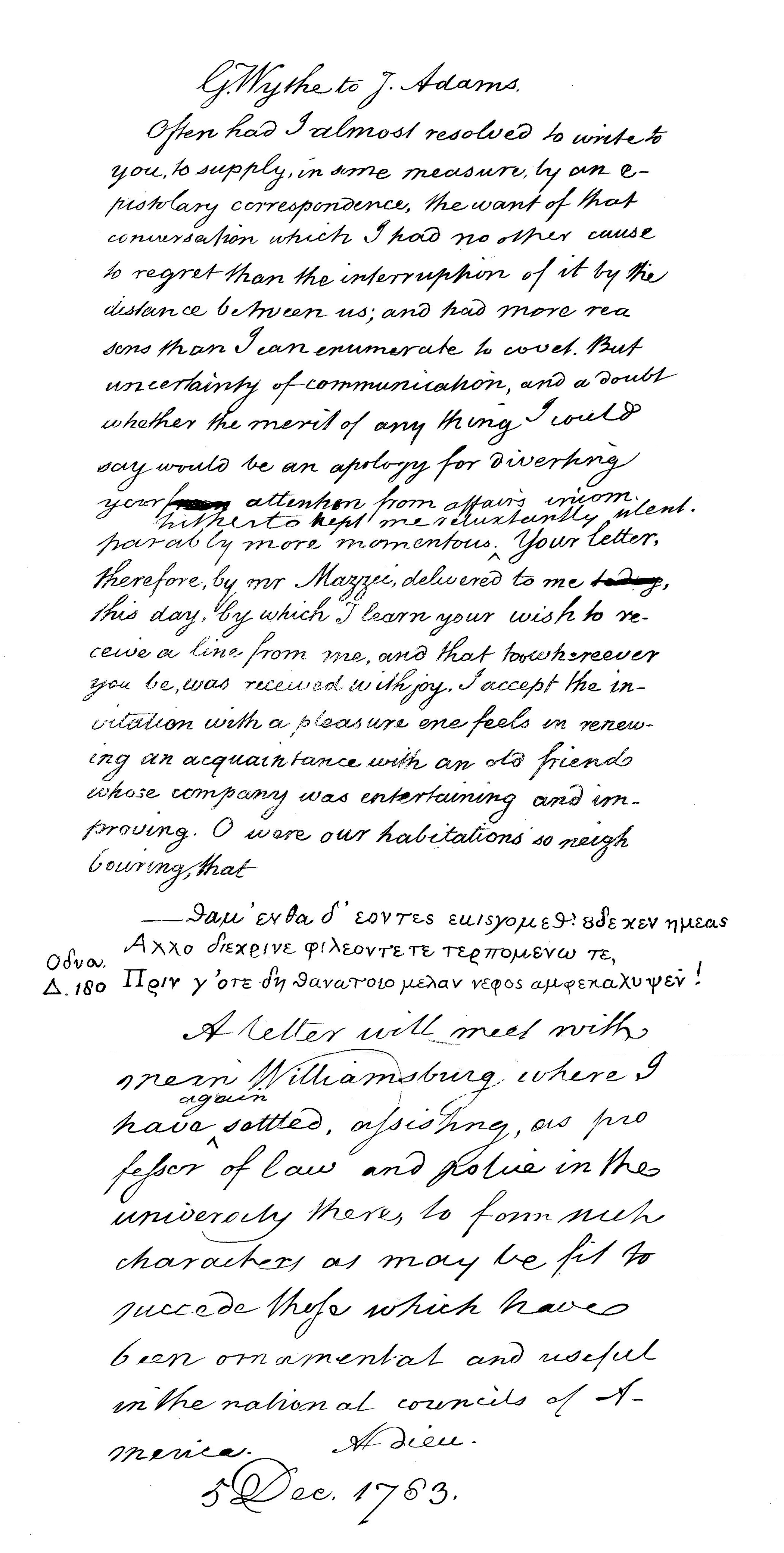Difference between revisions of "Wythe to Adams, 5 December 1783"
m |
m |
||
| Line 14: | Line 14: | ||
— θάμ᾽ ἐνθάδ᾽ ἐόντες ἐμισγόμεθ᾽: οὐδέ κεν ἡμέας<br /> | — θάμ᾽ ἐνθάδ᾽ ἐόντες ἐμισγόμεθ᾽: οὐδέ κεν ἡμέας<br /> | ||
ἄλλο διέκρινεν φιλέοντέ τε τερπομένω τε,<br /> | ἄλλο διέκρινεν φιλέοντέ τε τερπομένω τε,<br /> | ||
| − | πρίν γ᾽ ὅτε δὴ θανάτοιο μέλαν νέφος ἀμφεκάλυψεν!<ref>Homer, ''[[Odyssey of Homer|The Odyssey]],'' | + | πρίν γ᾽ ὅτε δὴ θανάτοιο μέλαν νέφος ἀμφεκάλυψεν!<ref>Homer, ''[[Odyssey of Homer|The Odyssey]],'' 4:178-180: |
<blockquote> | <blockquote> | ||
| − | Living here we | + | Living here, should we ofttimes have met together,<br /> |
| − | nor | + | nor would aught have parted us, loving and joying in one another<br /> |
| − | until the black cloud of death | + | until the black cloud of death enfolded us. |
</blockquote> | </blockquote> | ||
</ref> | </ref> | ||
Revision as of 11:38, 6 April 2018
In this letter, George Wythe espouses his friendship with John Adams, and states that, as Professor of Law and Police at the College of William & Mary, his role is "to form such characters as may be fit to succeed those which have been ornamental and useful in the national councils of America":[1]
Letter text, 5 December 1783
G. Wythe to J. Adams.Often had I almost resolved to write to you, to supply, in some measure, by an epistolary correspondence, the want of that conversation which I had no other cause to regret than the interruption of it by the distance between us; and had more reasons than I can enumerate to covet. But uncertainty of communication, and a doubt whether the merit of any thing I could say would be an apology for diverting your
fromattention from affairs incomparably more momentous hitherto kept me reluctantly silent. Your letter, therefore, by mr Mazzei, delivered to metoday,this day, by which I learn your wish to receive a line from me, and that too wherever you be, was received with joy. I accept the invitation with a pleasure one feels in renewing an acquaintance with an old friend whose company was entertaining and improving. O were our habitations so neighbouring, thatοδύσύ.
Δ. 180— θάμ᾽ ἐνθάδ᾽ ἐόντες ἐμισγόμεθ᾽: οὐδέ κεν ἡμέας
ἄλλο διέκρινεν φιλέοντέ τε τερπομένω τε,
πρίν γ᾽ ὅτε δὴ θανάτοιο μέλαν νέφος ἀμφεκάλυψεν![2]A letter will meet with me in Williamsburg where I have again settled, assisting, as professor of law and police in the university there, to form such characters as may be fit to succede those which have been ornamental and useful in the national councils of America. Adieu.
5 Dec. 1783.
See also
- Wythe, John Adams & Silas Deane to Nathaniel Woodhull, 19 October 1775
- Wythe, John Adams & Silas Deane to James Warren, 24 October 1775
- Thomas Greenough to Wythe, John Adams, & Silas Deane, 22 December 1775
- Joseph Blewer & Daniel Robinson to Wythe, John Adams, & Silas Deane, 2 February 1776
- Jonathan Trumbull to Wythe & John Adams, 9 March 1776
- Jonathan Trumbull to Wythe and John Adams, 25 March 1776
References
- ↑ George Wythe to John Adams, 5 December 1783, reproduced in The Works of John Adams, vol. 3, Charles Francis Adams, ed. (Boston: Charles C. Little and James Brown, 1851), between 354 and 355.
- ↑ Homer, The Odyssey, 4:178-180:
Living here, should we ofttimes have met together,
nor would aught have parted us, loving and joying in one another
until the black cloud of death enfolded us.
External links
- From George Wythe, 5 Dec. 1783, Founding Families: Digital Editions of the Papers of the Winthrops and the Adamses, ed. C. James Taylor (Boston: Massachusetts Historical Society, 2018).
- To John Adams from George Wythe, 5 December 1783, Founders Online, National Archives
